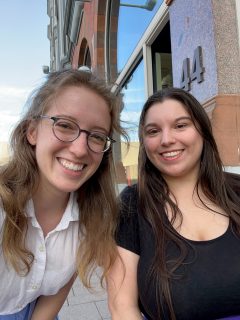Name: Erin McCoy & Atara Lonn
Area of Study: Personality/Social
In what program are you currently enrolled? PhD
What year of the program are you currently in? Erin is in her 2nd year and Atara is in her 1st year.
Citation in APA format:
McCoy, E., Lonn, A., & Harasymchuk, C. (2023). Interpersonal playfulness as a protective factor against loneliness and boredom in single people living alone during the COVID-19 lockdown. Leisure Sciences, 1-18
Plain language abstract:
The COVID-19 pandemic added challenges to most people’s lives, while lockdown measures curtailed many coping mechanisms. Interpersonal playfulness, which is a tendency to find amusement and entertainment in everyday social contexts, was evaluated as a protective factor. We gathered open-ended responses and quantitative data over six weeks (once weekly) from a sample of single people living alone to examine the occurrence of interpersonal playful behaviors and the association between interpersonal playfulness with loneliness and boredom, at both the trait level and fluctuating each week within individuals. Qualitatively, people reported engaging in playful behaviors despite lockdown mandates, especially more playful people. Further, people who tended towards dispositional playfulness relative to others, and people feeling more playful than their usual, experienced less loneliness and boredom. Exploratory results suggest positive affect partially explained the link between playfulness and both loneliness and boredom. This study supports playfulness as an adaptive trait during challenging circumstances.
How did the idea for this research come about?
A large data set of surveys following single people living alone in Ontario across six weeks was collected in the lab during the first lockdown. When we were looking for a project to collaborate on both of us were drawn to the playfulness scale in this dataset since it seemed likely that engaging in playful behavior was probably particularly difficult for this group of people in lockdown. We also thought that this demographic was likely particularly vulnerable to being bored and lonely at this time. This led us to our overall research question of if playfulness can protect people from feeling lonely and bored, especially during such a challenging time. We were also excited to have weekly data from participants, so we could stretch our statistical skills to look at both between- and within- person results.
How did you collect the data for this project?
Data was collected online during the first pandemic related lockdown in Ontario. Single people who were living alone were recruited from Reddit. The participants completed an initial background survey, and then shorter surveys one weekly for the next five weeks. This allowed us to measure some individual fluctuations across a total of six weeks, making both between-and within-person analyses possible.
Was the journal you published in the first journal you submitted this paper to?
Yes.
Why did you choose this journal?
Given that playfulness is a fairly niche topic, finding a good journal fit was important. We were glad to find a journal that focused specifically on research about leisure and that had published papers about playfulness previously.
How many other journals did you submit this paper to before it landed in the journal that eventually published your work?
0
What was your revision experience?
The revision experience went quite smoothly! Although waiting to hear back definitely took a fair bit of patience, we were relieved when the revisions came back as quite minor. Mostly we needed to clarify some information and wording. The reviewers usefully noted that our paper was focused on interpersonal play, rather than solitary play, so the addition of “interpersonal” to the title and throughout the paper was one of the larger clarifications made. Some of the statistical prompts were a bit challenging to think through – we had to make a case as to why we were examining panel data from a more cross-sectional perspective rather than strictly longitudinal analyses (e.g., growth curves). In our case, the variables did not show a clear trend of increasing or decreasing over time, but rather fluctuated up and down depending on the week and individual. Thus, longitudinal analyses were deemed inappropriate.
How many rounds of revision did you experience?
1
Did you need to collect new data to satisfy a reviewer?
No.
How long did it take from first submission to acceptance?
7 months
Was this paper conducted as part of your MA thesis?
No.
Was this paper conducted as part of your PhD dissertation?
No.
Was this research conducted with your supervisor?
Yes, this research was conducted with our thesis supervisor, Dr. Cheryl Harasymchuk.
Was this research conducted with fellow graduate students in our program?
Yes, Erin McCoy and Atara Lonn collaborated on this project.
Was this research conducted with researchers external to Carleton?
No.
You can access the article here.